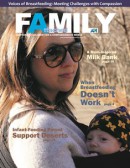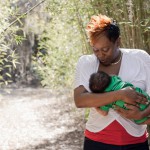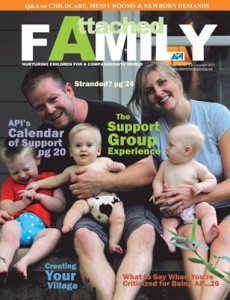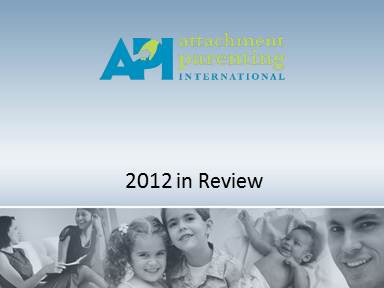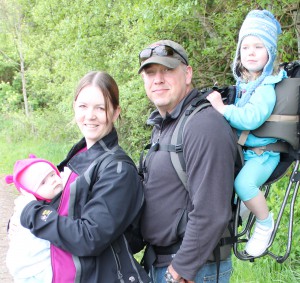By Rita Brhel, Editor of Attached Family magazine, API’s Publications Coordinator
 What this year’s celebration of World Breastfeeding Week is really about—more than updating the status on breastfeeding acceptance or increasing understanding for mothers who are unable to breastfeed—is advocacy for parent support.
What this year’s celebration of World Breastfeeding Week is really about—more than updating the status on breastfeeding acceptance or increasing understanding for mothers who are unable to breastfeed—is advocacy for parent support.
While the primary goal of Attachment Parenting International (API) is to raise awareness of the importance of a secure parent-child attachment, the organization’s overarching strategy is to provide research-backed information in an environment of respect, empathy and compassion in order to support parents in making decisions for their families and to create support environments in their communities. API extends beyond attachment education, also promoting the best practices in all aspects of parenting from pregnancy and childbirth to infant feeding and nurturing touch to sleep and discipline to personal balance and self-improvement through such innovative programs as API Support Groups, the API Reads book club and the Journal of Attachment Parenting, just to name a few.
API is a parent support organization made up of parents located around the world with a deep desire to support other parents.
Parent Support Deserts
In this spirit, API created the Parent Support Deserts project through which we mapped gaps in local parent support opportunities specific to Attachment Parenting (AP). The goals of this multi-layered project are to identify communities, regions and nations in need of conscious-minded parent support and to encourage collaboration among like-minded organizations to address these gaps.
The first part of the project was identifying key nations of the world that we feel would ideally have organized, like-minded parent support options available. We focused on developed countries, because societal advance encourages separation from the natural world, including biologically instinctual ways of living and relating to one another, as is reflected in family structure and mainstream parenting philosophies. Industrialized nations lead the world in ideas and developing, and less-industrialized and underdeveloped nations tend look to these societies for guidance. We used the World Bank’s list of Developed Countries and Territories. All of the nations included in the project are defined as high-income economies as determined by Gross National Product, per-capita income, level of industrialization, widespread technological infrastructure and high standards of living.
The second part of the project was identifying key parent support organizations. We were looking for representative organizations with local support groups or classes with an approach to parent support that closely matches that of API—advocating for conscious, informed parenting choices that challenge the status quo:
- Attachment Parenting International
- Babywearing International
- Holistic Moms Network
- International Association of Infant Massage
- International Cesarean Awareness Network
- La Leche League International
- Pathways Connect
API recognizes that there are myriad local parent support opportunities in many communities that are not affiliated with these key parent support organizations, such as peer counselors, professionals, groups and classes available through hospitals, clinics, faith-based organizations, schools, etc. and that some of these may be quality, AP-minded programs. We appreciate this and welcome these independent programs to nominate themselves for inclusion in the Parent Support Deserts project through rita@attachmentparenting.org.
We have a bias toward local support groups because the research validates the importance of a parenting support network. This may be provided through family, friends, coworkers and others in an informal way, but a community of like-minded parents is an empowering environment for parents learning about and growing in their parenting approach.
It is to be noted that not all communities identified as having a parent support option may have an active local support group at any one time, as some local leaders hold groups while others, depending on their own life stage or lack of interest from the community, opt not to lead a group but to remain available for one-on-one support. What was important in mapping communities was identifying those with an active parent support leader affiliated with one of the key parent support organizations who is either leading a group or class, or is available to provide support in this way should the interest from parents arise.
It is also to be noted that local support groups or classes unaffiliated with API may provide varying degrees of AP education that may or may not be aligned with API’s Eight Principles of Parenting. However, each of these representative organizations promote an environment that empowers parents in finding their own path for intentional parenting.
The third part of the project is dissecting each nation into both parent support deserts as well as oases. The first nation we are focusing on is the United States.
Future steps include cross-examining data according to risk factors such as areas with low breastfeeding rates, high infant mortality, high Cesarean rates and other aspects of public health, as well as creating maps to illustrate parent support deserts and oases, and inviting discussion among the AP community in how to address gaps in parent support.
Infant-Feeding Parent Support Deserts
Local parent support for breastfeeding has grown at an astonishing rate since La Leche League (LLL) International was founded in Illinois, USA, in 1956. LLL groups are located worldwide in nearly all developed nations as well as other less-developed countries. LLL has expanded its resources as cultures have evolved with technology and the changing roles for mothers, assisting mothers in providing breast milk to their infants whether through exclusive or partial breastfeeding or pumping as needed.
As research pours in on the benefits of breast milk and breastfeeding, evidence continues to point toward AP practices, such as using fewer interventions during childbirth, avoiding early mother-baby separation, rooming-in at the hospital, breastfeeding on demand, interpreting pre-cry hunger signals, encouraging skin-to-skin contact, room sharing, discouraging cry-it-out sleep training, helping the father in supporting the mother, and others. As a result, the vast support network that many communities now have for breastfeeding mothers—from a breastfeeding-friendly medical community to lactation consultants and peer counselors to doulas and childbirth educators and parent educators trained in lactation support—tend to direct breastfeeding mothers toward Attachment Parenting.
By contrast, there are few organized AP-minded support opportunities for mothers who are unable to or choose not to breastfeed or feed expressed breast milk. Formula-feeding parents are relatively on their own in terms of finding support that rightly points them in the direction of Attachment Parenting, as this choice or necessity to bottle-feed exclusively is seen less as part of the relationship context and more solely a nutritive option—though certainly we know, and research in sensitive responsiveness is finding, the behaviors surrounding bottle feeding are as much a part of the parent-child relationship as is breastfeeding. Unlike breastfeeding support, formula-feeding support is much less cohesive, with some information sources putting forth questionable science regarding formula versus breastfeeding benefits.
This gap in support provides an opportunity for API Support Groups and other like-minded organizations to offer acceptance, validation and support in AP practices to non-breastfeeding mothers. One program in the United States that does this is the Special Supplemental Nutrition Program for Women, Infants, and Children (WIC), putting as much attention on formula-feeding mothers as those who choose to breastfeed.
For this introductory look at the Parent Support Deserts project, we examined locations of parent support groups in terms of infant-feeding in the Attachment Parenting context. We focused on LLL for breastfeeding support and API for both breastfeeding and formula-feeding support. Specifically, we were looking at:
- Unsupported Key Communities = Communities of 100,000 or more, or state capitals, without either an LLL or an API presence.
- Undersupported Key Communities = Communities of 100,000 or more, or state capitals, with either an LLL or an API presence, but not both.
- Notable Communities = Communities of any population with both an API and LLL presence as well as other Attachment Parenting-minded support.
Key communities have a population of at least 100,000 or are state capital cities, because of these communities’ population density and centrality to policymaking and lawmaking.
We recognize that families in less-populated areas are as much in need of support. The Parent Support Desert project has found that LLL’s distribution worldwide and within the United States includes both urban and rural population centers, making LLL unique among like-minded organizations. API considers LLL to be an important partner in the Attachment Parenting movement, not only because of its representative size, reach and longevity but also because the parenting support provided in addition to breastfeeding education is directly in line with that promoted by API.
While this list is in flux, following are state reports of API’s Parent Support Deserts specific to Attachment Parenting infant-feeding support in the United States as spring 2014:
Alabama
- Undersupported Key Communities: Mobile, Montgomery (capital)
- Notable Communities: Huntsville-Madison
Alaska
- Undersupported Key Communities: Anchorage, Juneau (capital)
Arizona
- Unsupported Key Communities: Chandler, Gilbert, Mesa, Peoria, Tempe, Scottsdale, Surprise
- Undersupported Key Communities: Tucson
- Notable Communities: Phoenix (capital)
Arkansas
- Notable Communities: Little Rock (capital), Searcy
California
- Unsupported Key Communities: Anaheim, Carlsbad, Chula Vista, Concord, Corona, Costa Mesa, Daly City, Downey, El Cajon, El Monte, Escondido, Fontana, Fullerton, Garden Grove, Hayward, Huntington Beach, Inglewood, Moreno Valley, Norwalk, Ontario, Palmdale, Pomona, Rancho Cucamonga, Rialto, Richmond, Riverside, Salinas, San Bernardino, Santa Clara, Santa Maria, Sunnyvale, Torrance, Vallejo, Victorville
- Undersupported Key Communities: Bakersfield, Burbank-Glendale, Elk Grove, Fairfield, Fremont, Humboldt, Lancaster/Antelope Valley, Marin, Modesto, Oakland-Berkeley, Oceanside, Oxnard, Pasadena, Pittsburgh-Antioch, Roseville-Citrus Heights, San Jose, Santa Clarita, Santa Rosa, Simi Valley, Stockton, Temecula-Murrieta, Thousand Oaks, Tulare-Visalia, Ventura, West Covina
- Notable Communities: Long Beach, Los Angeles, Monterey, Sacramento (capital), San Diego, San Francisco, Santa Ana/Orange County
Colorado
- Unsupported Key Communities: Westminster
- Undersupported Key Communities: Arvada, Aurora, Boulder, Centennial, Colorado Springs, Fort Collins, Lakewood, Pueblo, Thornton
- Notable Communities: Denver (capital), Parker
Connecticut
- Unsupported Key Communities: Hartford (capital), Stamford
- Undersupported Key Communities: Bridgeport, Greenwich-Stamford, New Haven, Southington-New Britain, Waterbury
Delaware
- Unsupported Key Communities: Dover (capital)
Florida
- Unsupported Key Communities: Cape Coral, Coral Springs, Hialeah, Miami Gardens, Palm Bay, Pembroke Pines, Pompano Beach, Port St. Lucie, St. Petersburg
- Undersupported Key Communities: Clearwater, Fort Lauderdale, Gainesville, Hollywood, Miami, Miramar, Orlando, Tallahassee (capital), Tampa
- Notable Communities: Jacksonville
Georgia
- Undersupported Key Communities: Athens, Augusta, Columbus, Savannah
- Notable Communities: Atlanta (capital)
Hawaii
- Undersupported Key Communities: Honolulu (capital)
Idaho
- Undersupported Key Communities: Boise (capital)
Illinois
- Unsupported Key Communities: Elgin, Joliet
- Undersupported Key Communities: Aurora-Montgomery-Oswego, Peoria, Rockford, Springfield (capital)
- Notable Communities: Chicago, Naperville
Indiana
- Undersupported Key Communities: Evansville, Fort Wayne, Indianapolis (capital), South Bend
Iowa
- Unsupported Key Communities: Cedar Rapids
- Undersupported Key Communities: Cedar Falls-Waterloo, Quad Cities
- Notable Communities: Des Moines (capital)
Kansas
- Unsupported Key Communities: Olathe, Overland Park, Wichita
- Undersupported Key Communities: Kansa City, Lenexa-Shawnee
Kentucky
- Unsupported Key Communities: Frankfort (capital)
- Undersupported Key Communities: Lexington
- Notable Communities: Louisville
Louisiana
- Unsupported Key Communities: Shreveport
- Undersupported Key Communities: Baton Rouge (capital), Lafayette, New Orleans
Maine
- Unsupported Key Communities: Augusta (capital)
Maryland
- Undersupported Key Communities: Annapolis (capital), Baltimore, Washington D.C. (nation’s capital)
Massachusetts
- Unsupported Key Communities: Cambridge, Lowell
- Undersupported Key Communities: Boston (capital), Worchester
Michigan
- Unsupported Key Communities: Flint, Sterling Heights
- Undersupported Key Communities: Ann Arbor, Downriver, Grand Rapids, Lansing (capital), Warren
- Notable Communities: Detroit, Saginaw
Minnesota
- Undersupported Key Communities: Bloomington-Richfield, Rochester
- Notable Communities: Duluth, Minneapolis-St. Paul (capital)
Mississippi
- Notable Communities: Jackson (capital)
Missouri
- Unsupported Key Communities: Independence
- Undersupported Key Communities: Columbia, Jefferson City (capital), Kansas City, Springfield
- Notable Communities: St. Louis
Montana
- Undersupported Key Communities: Billings, Helena (capital)
Nebraska
- Undersupported Key Communities: Omaha
- Notable Communities: Lincoln (capital)
Nevada
- Unsupported Key Communities: Carson City (capital), Henderson, Reno
- Notable Communities: Las Vegas
New Hampshire
- Unsupported Key Communities: Manchester/Merrimack Valley
- Undersupported Key Communities: Concord (capital)
New Jersey
- Unsupported Key Communities: Elizabeth, Patterson
- Undersupported Key Communities: Trenton (capital)
New Mexico
- Undersupported Key Communities: Albuquerque, Las Cruces, Santa Fe (capital)
New York
- Unsupported Key Communities: Oyster Bay, Yonkers
- Undersupported Key Communities: Albany (capital), Bronx, Brooklyn, Buffalo, New York City, Queens, Rochester, Staten Island, Syracuse
- Notable Communities: Long Island, Manhattan
North Carolina
- Undersupported Key Communities: Cary, Charlotte, Durham, Fayetteville, Greensboro, High Point, Raleigh (capital), Wilmington, Winston-Salem
- Notable Communities: Greenville
North Dakota
- Undersupported Key Communities: Bismarck (capital), Fargo
Ohio
- Undersupported Key Communities: Akron, Cincinnati, Cleveland, Columbus (capital), Dayton, Toledo
Oklahoma
- Unsupported Key Communities: Broken Arrow
- Undersupported Key Communities: Norman, Oklahoma City (capital), Tulsa
Oregon
- Undersupported Key Communities: Eugene-Springfield, Gresham, Salem (capital)
- Notable Communities: Portland
Pennsylvania
- Unsupported Key Communities: Allentown
- Undersupported Key Communities: Erie, Harrisburg (capital), Philadelphia
- Notable Communities: Pittsburgh
Rhode Island
- Undersupported Key Communities: Providence (capital)
South Carolina
- Undersupported Key Communities: Charleston, Columbia (capital), Grand Strand
South Dakota
- Unsupported Key Communities: Pierre (capital), Sioux Falls
Tennessee
- Undersupported Key Communities: Chattanooga, Clarksville, Memphis, Murfreesboro
- Notable Communities: Knoxville, Nashville (capital)
Texas
- Unsupported Key Communities: Abilene, Beaumont, Brownsville, Carrollton, Grand Prairie, Laredo, Mesquite, Midland, Odessa, Richardson, Round Rock
- Undersupported Key Communities: Amarillo, Arlington, Bryan-College Station, Corpus Christi, Dallas, Denton, El Paso, Fort Worth, Garland, Irving, Killeen, Lubbock, McAllen, Pasadena, Plano, Waco, Wichita Falls
- Notable Communities: Austin (capital), Houston, McKinney, San Antonio
Utah
- Unsupported Key Communities: Provo, West Valley City
- Undersupported Key Communities: Salt Lake City (capital), West Jordan
Vermont
- Undersupported Key Communities: Montpelier (capital)
Virginia
- Unsupported Key Communities: Hampton, Newport News
- Undersupported Key Communities: Alexandria-Arlington County, Chesapeake, Norfolk, Richmond (capital), Virginia Beach
- Notable Communities: Fredericksburg
Washington
- Undersupported Key Communities: Bellevue, Everett, Kennewick-Pasco-Richland, Kent, Olympia (capital), Seattle, Spokane, Tacoma, Vancouver
- Notable Communities: Port Angeles
West Virginia
- Undersupported Key Communities: Charleston (capital)
Wisconsin
- Undersupported Key Communities: Kenosha, Madison (capital), Milwaukee
- Notable Communities: Green Bay, Oshkosh
Wyoming
- Undersupported Key Communities: Cheyenne (capital)
